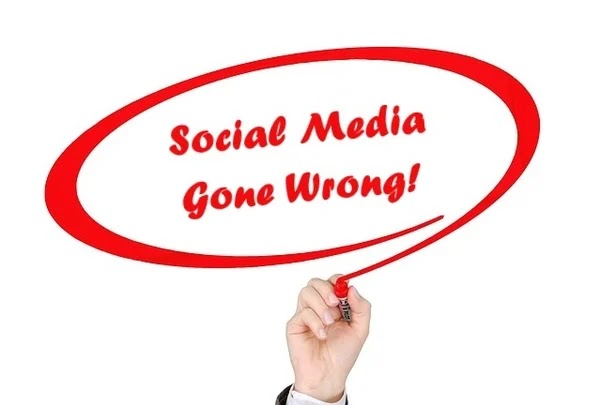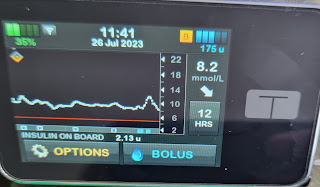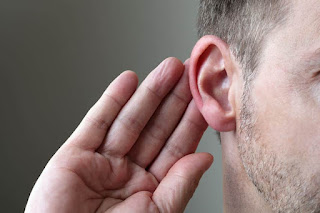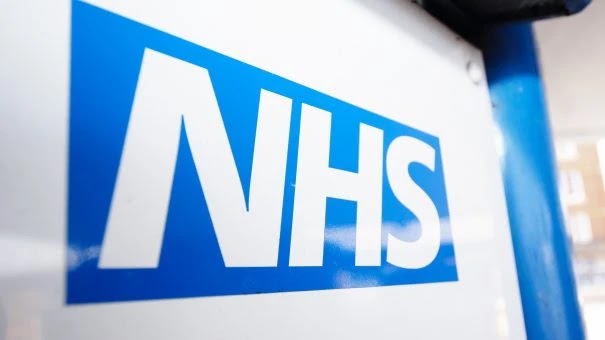World Diabetes Day saw an eagerly awaited NHS document on peer support published. 'The Six Principles of Good Peer Support for People Living With Type 1 Diabetes' hit the NHS website and various socials. Many congratulatory responses were passed around, including my own.
I've written and spoken about peer support, both formally and informally, many times and I make no apologies for that. It might just be the key element in my own T1D care - the reasons for that? I've detailed so many times that I won't bother to do so again in this blog post, you likely already know them very well and I don't want to lose your attention in paragraph two.
Let's take a quick look at the six principles which the NHS and helpers believe to be part of good peer support if you have T1D. I'll throw in my comments in Italics and bold.
1. Driven by the shared experiences of people living with Type 1 Diabetes
Why is this important?
The value of good peer support comes from people sharing their experiences, frustrations and successes with others who have been through similar things themselves.
Straight in there with shared experiences. Great stuff. Many of us love to share but also to learn from the experiences of others. I think it's important to remember that, despite T1D, we are all very different in many ways. A review of a CGM or a pump can be completely different from person to person, a visit to a certain clinic, reactions to certain meds, diets, exercise. It's very obvious that there is little in the way of black and white when it comes to T1D. Taking on board the words of others and their experiences can absolutely prepare a person, give them a heads up, etc but don't always take a shared experience as gospel.
What does this mean for:
People with Type 1 diabetes accessing and giving group support as a group member?
People can share real-world examples of how living with Type 1 diabetes affects them. They can find reassurance and support from other people in the group who know what it’s like to live with the condition.
Absolutely. How often do you read "Hard relate" when somebody shares an experience? Very often, for me.
People giving Type 1 diabetes peer support as a group leader/facilitator?
Facilitators being able to share their own experiences with confidence will help and encourage others to do the same, whilst being mindful that each person’s own experience is unique.
Mindful indeed. I'm pleased that this was added in Principle 1. Peer support cannot be "Do it this way because it works for me". Well done to whoever pushed that in.
Clinicians and service providers?
Referring people to a group of ‘experts by experience’ will provide a vital avenue for people to feel confident and supported in living with Type 1 diabetes.
I'm not comfortable with 'experts'. We might be! about our own T1D but about living with T1D in general? By all means, refer to yourself as an expert if you're happy with that. I think the word might also set high expectations from the newly diagnosed or those looking for a specific type of support. Peer support is largely voluntary and it might be very respectful to refer to us volunteers as experts but, I worry about expectations and disappointment. Clinicians could refer people to 'Experienced people living with T1D' and if specific support is needed? '...T1D and a related issue'. I run a T1D group for men, that might look like '...T1D and men's health'
2. Reciprocal, with opportunities for people to ‘give and get’, as well as to learn from one another
Why is this important?
Reciprocal support recognises the mutual benefit of giving and receiving support
What does this mean for:
People with Type 1 diabetes accessing and giving group support as a group member?
All experiences of living with Type 1 diabetes are valid and no one person is more ‘expert’ than another. It would be helpful for group members to understand the difference between information and advice.
Fabulous. Nobody is more important than another in peer support circles. Ugh "expert". No one person's experiences are more valid than another? Great, RE: info and advice. Do the signposting thing and the "My experience of that is..." thing.
People giving Type 1 diabetes peer support as a group leader/facilitator?
The reciprocity of peer support emphasises the importance of creating a flexible space for people to share their experiences and from people to ‘give and get’ from one another. It is recommended that Facilitators have confidence in leading groups, including the ability to manage group dynamics and potentially difficult discussions.
Absolutely right. The GBDoc Twitter accounts often throw up issues and decision making which sometimes needs much discussion. To lead or facilitate requires a skill set that some don't possess. A track record is vital to good (and safe) peer support groups.
Clinicians and service providers?
Confidence that people are being referred to an evidence-based, overarching experience that gives meaning and purpose.
A good track record? Cool.
3. Safe and encouraging, enabling people to share their experiences free from any judgement
Why is this important?
Peer support should provide people with a safe, non-judgmental environment to be able to talk about their experiences of Type 1 diabetes.
What does this mean for:
People with Type 1 diabetes accessing and giving group support as a group member?
In listening to others’ experiences and building trust and confidence in the peer support group, people should feel safe to share their own experience of living with Type 1 diabetes. All group members may contribute to and agree common ground rules and boundaries (for example confidentiality) that will enable this trust to be built.
Essential and well done to whoever pushed this through.
People giving Type 1 diabetes peer support as a group leader/facilitator?
Peer supporters should create the right conditions for a safe, nurturing, and welcoming environment, enabling and encouraging people living with Type 1 diabetes to share their own experiences and to learn from others. Group leaders might want to be aware of the benefit of establishing ground rules and/or a group agreement.
Absolutely right. In my own groups, we vet private group members before acceptance. In the open groups such as the GBDoc Twitter accounts, volunteers will discuss decisions to keep people safe and share information about anything which might put someone or a group of people at risk.
Clinicians and service providers?
Confidence in referring people with Type 1 diabetes to a safe and supportive peer support group.
A good track record of protecting peers? Cool!
4. Accessible and inclusive, available to everyone with Type 1 diabetes
Why is this important?
Everyone with Type 1 diabetes should have equal access to peer support.
What does this mean for:
People with Type 1 diabetes accessing and giving group support as a group member?
People can feel confident that they can access their choice of peer support group.
People giving Type 1 diabetes peer support as a group leader/facilitator?
Clear thought should be given to what would make groups accessible and inclusive e.g. the appropriate language for health literature, physical accessibility and/or cultural or religious considerations.
Barriers that might prevent people from accessing support should be mitigated wherever possible.
It is unlikely that any one group or avenue of support will be able to meet the needs of large groups of people, so knowing about and being able to signpost alternative avenues of support is useful.
I agree about unlikely but it is massively important to TRY. GBDoc has an Accessibility Pledge to cover very basic things in terms of accessibility such as ALT text (image descriptions) and disability friendly venues for get togethers. It is incredible to still see that many accounts of communities and their leaders/facilitators do not consider this. It has taken a lot of work from me to get the major diabetes charities on board with ALT text. I don't have high hopes for some volunteer led communities which offer peer support, sadly. That said, again, well done to whoever pushed through this very important aspect.
Clinicians and service providers?
Confidence in referring people to an accessible and inclusive peer support group.
Please check this before referring. Imagine referring somebody living with visual impairments to an account which does not ALT text their images?
4. Person-centred, taking account of each person’s own strengths, values, needs and feelings
Why is this important?
Peer support should be focused on each person, their own unique characteristics, and what matters to them.
What does this mean for:
People with Type 1 diabetes accessing and giving group support as a group member?
People with Type 1 diabetes are seen as a whole person in the context of their own lives and experiences. Good peer support can help people to understand where their existing strengths and assets lie and how they can draw on these to help them manage their day to day lives.
People giving Type 1 diabetes peer support as a group leader/facilitator?
Good listening skills are implicit in supporting someone to identify their own skills and resources, as well as what is available to them in the community. Good peer support looks outside the peer support group itself to signpost effectively to other services, which meet the needs of each person in the group.
Perfect. Listen to your peers and the language they use, I guess? Send them to the right resources or another group if need be.
Clinicians and service providers?
Confidence that people are being supported to develop their knowledge, skills and confidence to support their Type 1 Diabetes.
5. Complementary, working hand in hand with health and social care providers
Why is this important?
Good peer support should run alongside existing health and social care provision, enabling holistic provision of services to suit each individual person’s needs.
What does this mean for:
People with Type 1 diabetes accessing and giving group support as a group member?
Good peer support is one component in a complete toolkit of care. It provides options, opportunities, and choice for people to live well with Type 1 diabetes.
People giving Type 1 diabetes peer support as a group leader/facilitator?
Working in a complementary way means that people will be encouraged to access a range of services that best meet their needs. It recognises that peer support is only one aspect of Type 1 diabetes management.
Absolutely perfect.
Clinicians and service providers?
Confidence in referring to a peer support group to complement the service that they are providing.
-------
To read the full document then tap/click here
I'm very happy with this document, despite there being two point 4s and zero point 6 (eck!). I think it covers all the good basics and my concerns are few and very minor. I write that as a Type 1 Diabetic and as a facilitator of many peer support groups. The task now? I think to put together a well vetted database of groups and individuals which NHSE can call upon or offer to people when needed. How to vet? The usual record checks but consult those who have been neck-deep in peer support for years (good track record) within the United Kingdom. There is a safety disclaimer on the document and I think that's very wise Without any vetting of referred groups and individuals there needs to be a "you do this at your own risk" agreement in place.








